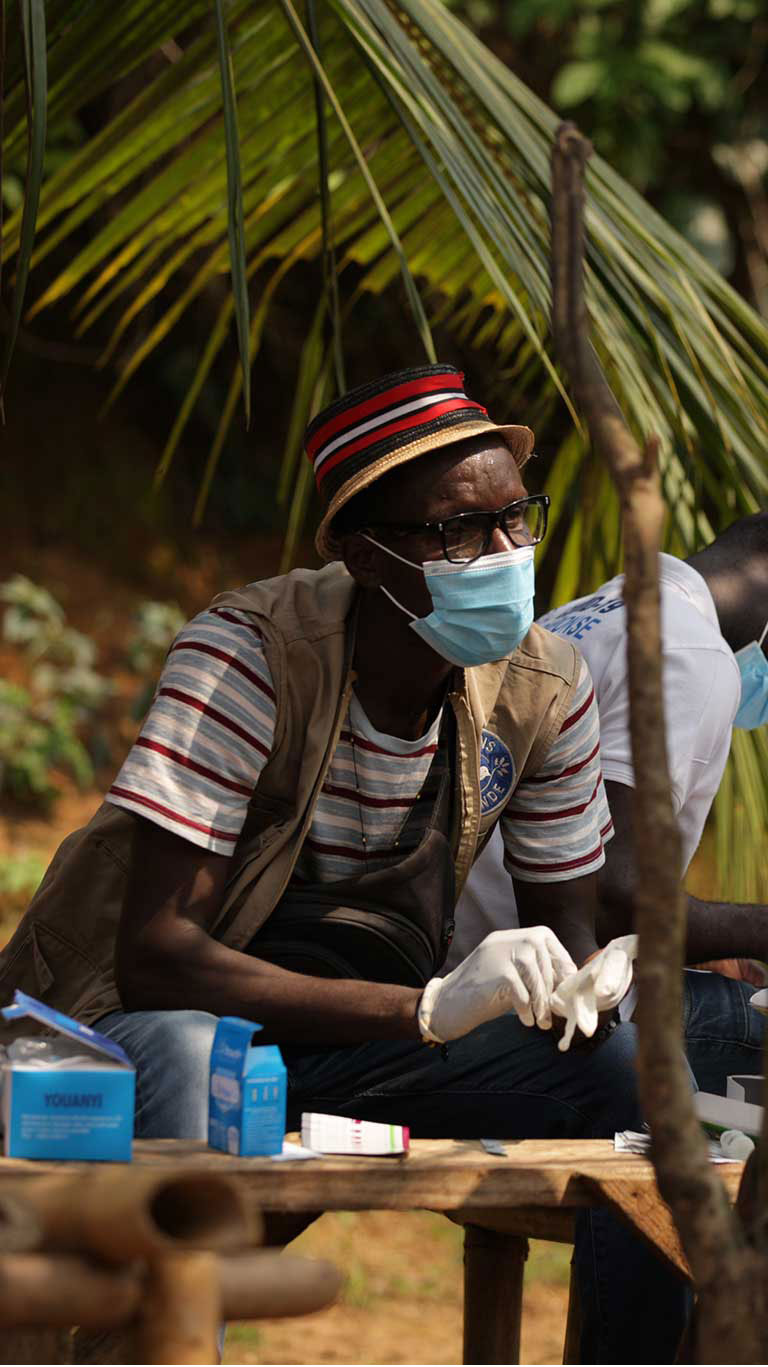4 mois d’intervention d’urgence à Abidjan suite à la crise post-électorale.

Côte d'Ivoire
© Charly Kodjo
- Home Page
- Côte d’Ivoire
of women aged between 15 to 49 do not use any modern methods of contraception.
women a day find out that they have cervical cancer.
women died from cervical cancer in 2020.
of maternal mortality is linked to unsafe abortions.
Médecins du Monde’s emergency response includes a range of humanitarian assistance programmes. Find out more below about our work and missions in Côte d’Ivoire.
THE HUMANITARIAN SITUATION IN CÔTE D’IVOIRE
Lack of a specific legislative framework, lack of funding for contraceptive products, stock shortages… Many barriers to quality sexual and reproductive healthcare still exist in Côte d’Ivoire. Furthermore, people who use drugs are extremely vulnerable to infectious diseases such as HIV, hepatitis C or tuberculosis and they need to be taken care of and given the appropriate care.
WOMEN ARE AT THE HEART OF INSECURITY
-
AN ALARMING MATERNAL MORTALITY RATE
Côte d’Ivoire has a maternal mortality rate of 614 deaths for 100,000 births, 15% of which are due to complications caused by unsafe abortions. In other words, one to two women die giving birth every day in Côte d’Ivoire.
-
BETWEEN ADOLESCENT PREGNANCIES AND DANGEROUS ABORTIONS
Nearly one adolescent out of two (45%) does not use a contraceptive method during their first sexual intercourse. Overall, only 30% of young people aged 10 to 24 use a modern method of contraception. Many elementary and secondary students become pregnant, leading to a high number of unsafe abortions: 75%, according to a study conducted in schools in 2018.
Despite the ratification of the Maputo protocol, the law remains very restrictive when it comes to abortion in Côte d’Ivoire; since 2019, the penal code permits abortion only in case of rape. Medical staff is not trained for unintended pregnancies, which in turn increases the number of people resorting to unsafe abortions.
-
SCREENING FOR CERVICAL CANCER IS NEGLECTED
In Côte d’Ivoire, cervical cancer is the second most frequent cancer amongst women aged 25 to 55, with 2,067 new cases reported in 2020. It is also the second cause of death by cancer for women.
The exploratory mission led by Médecins du Monde in Abidjan in 2017 highlighted a number of shortcomings, including a lack of training for medical staff, inadequate and/or insufficient awareness raising and a poor access to screening and treatment.
PEOPLE WHO USE DRUGS ARE VULNERABLE AS WELL
-
PREVENTING INFECTIOUS DISEASES
In 2014, Médecins du Monde carried out a study in Abidjan with 450 people who use cocaine, heroin and crack on a regular basis. The study shows that people who use drugs are vulnerable to infectious diseases due to risky sexual behaviour, their consumption of drugs and precarious living conditions.
The prevalence of HIV amongst people who use drugs in Abidjan dropped from 9.8% in 2014 to 3.4% in 2019, according to a study carried out by the firm CECAF for the national programme for the fight against AIDS. Sexually transmitted diseases are particularly high amongst people who use drugs, especially syphilis, with a prevalence of 9.3%. Similarly, the prevalence of tuberculosis amongst these individuals is higher than in the general population (according to the study conducted by the firm CECAF, 2.9% caught it in 2019), which leads to many cases of HIV/tuberculosis co-infection. 12.1% of people who use drugs have hepatitis B.
OUR WORK IN CÔTE D’IVOIRE
In Côte d’Ivoire, Médecins du Monde is responding to humanitarian needs by combining awareness raising and access to healthcare on different levels.
SUR LE TERRAIN - En maraude avec Samuel
CÔTE D'IVOIRE - Droits et santé pour les usagers de drogues
IMPROVING ACCESS TO SEXUAL AND REPRODUCTIVE HEALTH
-
FAMILY PLANNING SUPPORTIVE OF ADOLESCENT GIRLS
In 2016, Médecins du Monde carried out a study on sociocultural factors for unintended pregnancies: it demonstrated that the sexual and reproductive health services available to adolescent girls are inadequate. The data from a study carried out in April 2019 indicated that only 30% of young girls (aged 10 to 24) who are sexually active use a modern method of contraception, 81% of whom use the male condom. 10.3% of young girls interviewed for a survey have been pregnant at least once, and 36.4% of pregnancies end in abortion – 60% of which are unsafe abortions.
In 2017, Médecins du Monde carried out a project in support of the health system to improve prevention and unintended pregnancy care for adolescents and young people in the Nawa region (west of the country) using a rights-based approach.
This project ended in 2020. Médecins du Monde produced in partnership with the production company Wendigo a 52-minute documentary to improve the understanding of the key issues of unsafe abortions for women.
To help solve the issue of access to family planning services for women, young and adolescent girls, Médecins du Monde’s advocacy work is national, and the organisation is co-building with local and international players for the availability and the funding of family planning inputs. Our advocacy work is the cornerstone of our humanitarian mission in Côte d’Ivoire and underlines some alarming health issues.
-
AN INNOVATIVE APPROACH TO CERVICAL CANCER
Since 2020, Médecins du Monde has been developing a project for prevention, screening and precancerous cervix lesions care in Abidjan. The project was co-built with all the parties involved in it, on the community level; on an institutional level with the National Cancer Control Programme (PNLCa) and finally, with civil society. Those players have taken part in choosing where to intervene, what strategies to elaborate, trainings to develop, etc.
Four innovative approaches will be experimented:
- Setting up a screening strategy organised within the community thanks to the production of community health campaigns at home rather than in health centres,
- Giving women self-testing options should they want to, as an alternative to having it done by the medical staff, so that women play an active role in their health,
- Creating an innovative screening algorithm recommended by the WHO; initially by detecting HPV (Human Papilloma Virus) with a PCR test, then by searching for precancerous lesions with Visual Inspection with Acetic Acid (VIA) for patients who tested positive on the first test,
- Treating lesions with the thermocoagulation method as an alternative to cryotherapy, which is more expensive and more difficult to use.
-
SUMMARY
In 2021, we:
- Supported the production of a documentary film on unsafe abortions,
- Supported five advocacy initiatives regarding the bill on reproductive health; comprehensive sexual education; the SR/PF
- Coalition (coalition for family planning by civil society players), etc.
- Carried out a census in the intervention area, identifying 6,802 women aged between 25 and 49,
- Screened 1,126 women using HPV tests and 158 women using VIA tests,
- Trained 35 healthcare providers and 25 Community Health Agents (CHA),
- Rehabilitated and/or built and equipped 3 health structures with inputs,
- Conducted 1,817 medical home visits,
- Developed an analysis of the legal and institutional framework of cervical cancer in Côte d’Ivoire.
IMPROVING ACCESS TO HEALTHCARE FOR PEOPLE WHO USE DRUGS
-
FACILITATING PREVENTION AND CARE
Since January 2015 in Abidjan, Médecins du Monde and local partner humanitarian organisations carry out prevention and harm reduction (HR) initiatives for people who use drugs. The aim of that programme is to improve the health system’s care and its access for those populations. Médecins du Monde endeavours to empower these people to develop the appropriate responses and fight against stigmatisation, exclusion and criminalisation, which constitute barriers to access to care.
The CASA (addiction care and support centre) opened in 2018 is highly successful amongst people who use drugs. This centre offers community-based holistic care for people who use drugs. It is in this centre that for the first time in Côte d’Ivoire, methadone, an opioid substitution treatment (OST), is currently given to fifteen people who use drugs.
The third phase of the project (2021 – 2023) expands interventions to greater Abidjan, in Yamoussoukro, Bouaké and San Pedro. As in previous phases, three approaches are developed: the outreach model directly on consumption sites; the integrated model, aiming to strengthen the national health facilities to provide care for people who use drugs tailored to their needs; and the dedicated model which consists in creating or strengthening care centres dedicated exclusively for the people concerned.
-
SUMMARY
In 2021, we:
- Trained 217 people,
- Conducted 4,402 HIV tests for people who started using drugs recently,
- Supported 41 people who use drugs and tested positive for HIV and were admitted to care services,
- Collected 976 spit samples for suspected tuberculosis cases,
- Followed up with 213 people who use drugs and suffer from tuberculosis,
- Reached 5,527 people who use drugs through our interventions,
- Offered opioids substitution treatments to 15 people who use drugs.
-
7,004
Beneficiaries in 2021.
-
€ 2,681,223
Budget 2021.
Beneficiaries in 2021.
Budget 2021.
-
2011
-
2011
Projet d’appui aux urgences obstétricales dans le sud-ouest du pays.
-
2012
Partenariat pour la transition – appui à la gratuité ciblée dans le sud-ouest du pays.
-
2014
Etude auprès des usagers de drogues à Abidjan.
-
2014
Projet de renforcement du système de santé ivoirien.
-
2014
Préparation de réponse à l’épidémie Ebola dans le sud-ouest du pays.
-
2015
Ouverture d’un programme auprès des usagers de drogues à Abidjan.
-
2016
Étude sur les déterminants socio-culturels des grossesses non désirées auprès des jeunes.
-
2017
Étude communautaire sur la prévalence de la tuberculose et des facteurs associés chez les usagers de drogues à Abidjan.
Projet de prévention et de prise en charge des grossesses non désirées chez les jeunes en milieu scolaire à Soubré.
-
2018
2de phase du programme de RDR auprès des usagers de drogues à Abidjan et ouverture du Centre d’Accompagnement de Soins en Addictologie.
-
2020
Lancement d’un nouveau projet visant à prévenir, dépister et prendre en charge les lésions précancéreuses du col de l’utérus à Abidjan











